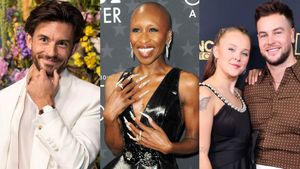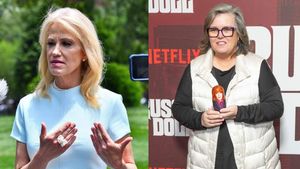An allusion to Kevin Hart set the tone for what would become the gayest Golden Globes in memory.
Hosts Sandra Oh and Andy Samberg made a coded reference to Hart -- who stepped down from hosting the Oscars after antigay tweets resurfaced -- in proclaiming they only got their current gigs because they are "the only two people left in Hollywood who haven't gotten in trouble for saying something offensive."
What followed was a "nicing" of nominees that were compliments instead of barbs. Even a reference to Hollywood's whitewashing of Asian parts produced an "I'm sorry!" from Emma Stone, who portrayed a character of Asian descent in Aloha. A lucky audience member, Oh and Samberg declared, "will host the Oscars" in Hart's place.
And in an emotional conclusion to the introduction, Oh recognized the "moment of change" occurring with the diversity of nominees present in the room at the Beverly Hilton in Los Angeles. "I see you," she told them and the audience at home. "And now, so will everyone else."
Later, Oh would win a Golden Globe for her performance as Eve Polastri in BBC America's Killing Eve. Polastri is a queer role and a history-making one, as Oh is now the first woman of Asian descent to win two Golden Globes -- the first being for Grey's Anatomy.
In fact, this year produced a record-number of queer roles recognized by the Hollywood Foreign Press, with many (mostly straight) actors filling their shoes. But thankfully, one of the first awards of the evening went to Ben Whishaw. The out A Very English Scandal, in his acceptance speech for Best Actor in a Supporting Role in a Limited Series, paid tribute to the man he portrayed, Norman Scott. "He's a true queer hero and icon and Norman this is for you," said the gay actor.
As background, Scott, born Norman Josiffe, was a stable hand whose affair with Jeremy Thorpe -- a British member of Parliament who would go on to become leader of the Liberal Party -- became a national scandal in the 1970s. The Thorpe affair -- and a trial that sprung from an unbelievable assassination attempt -- was the subject of A Very English Scandal.
The presenters also contributed to the queerness of the evening. The stars of The Favourite -- Olivia Colman, Emma Stone, Rachel Weisz, all nominated -- made several jokes about sex acts between women, in a nod to the love triangle between them in the film. Colman also alluded to their trysts in her acceptance speech when she won Best Performance by an Actress in a Motion Picture, Musical or Comedy; she affectionately referred to Weisz and Stone as "ma bitches."
In other queer presenter moments, Maya Rudolph staged a marriage proposal to Amy Poehler (she said yes!). A luminous Janelle Monae introduced If Beale Street Could Talk. And out producer Lena Waithe walked onstage holding hands with fellow presenter Halle Berry.
The moment couldn't get any queerer -- until it did. The pair presented the award of Best Television Limited Series to American Crime Story: The Assassination of Gianni Versace. The Ryan Murphy-produced FX series was one of the big winners of the evening; Darren Criss, who portrays Andrew Cunanan, also won for Best Performance by an Actor in a Limited Series.
Versace is one of the queerest shows on television, as it focuses on the killing of gay fashion designer Gianni Versace at the hands of a serial killer, and a few of Cunanan's male lovers as well. Brad Simpson, an executive producer of American Crime Story, stressed that the homophobia depicted in the series is still present and must be fought.
"Our show is a period piece, but those forces [of hatred] are not historical," said Simpson, standing next to Waithe, Murphy, and cast members like Ricky Martin and Judith Light. "They're here. They're with us. And we must resist."
In another queer moment, bisexual singer and A Star Is Born actress Lady Gaga shared a Golden Globe for Best Original Song, Motion Picture for "Shallow."
A Star Is Born -- Bradley Cooper's latest iteration of the diva-driven musical -- ultimately lost in the category of Best Motion Picture - Drama, disappointing many Gaga fans. But it lost to Bohemian Rhapsody, the blockbuster biopic of late bisexual Queen frontman Freddie Mercury. The spirit of Mercury was very much alive in the acceptance speech of producer Graham King. "Thank you for showing us the power of embracing your true self," he said. "This one's for you."
Rami Malek, The Advocate's current cover man, also took home Best Performance by an Actor in a Motion Picture - Drama for his portrayal of Mercury. In his speech, Malek thanked Mercury "for giving me the joy of a lifetime. I love you, you beautiful man. This is for and because of you, gorgeous!"
It should also be noted that the Golden Globes, in a history-making move, awarded its other Best Picture category, for Musical or Comedy, to another queer biopic: Green Book, which also took home Best Supporting Actor for Mahershala Ali and Best Screenplay. Ali portrays jazz pianist Don Shirley. Shirley never came out in his lifetime. But the film depicts a real-life incident in which the musician just barely escaped being arrested for a same-sex encounter at a YMCA.
Both Bohemian Rhapsody and Green Book are imperfect films. Bohemian Rhapsody has been criticized for how it portrayed Mercury's queer identity and his HIV diagnosis, which occurred much later than was presented in the film. The film's credited director, Bryan Singer, also cast a shadow over the win. Singer was fired by 20th Century Fox from the production before it ended after reports of erratic behavior, but a slew of sexual assault accusations throughout his career has gained renewed attention in the #MeToo era. He was unmentioned in both acceptance speeches.
Moreover, Green Book has been slammed by Shirley's own family for creating "a symphony of lies," and many have noted the problematic racial cliches and the centering of the film's story on the white driver, rather than the black musician.
There were also some notable queer snubs of the evening -- FX's Pose, one of its stars, Billy Porter, and the films Boy Erased and Can You Ever Forgive Me? received nominations but no wins.
But overall, it is remarkable how much LGBTQ stories took center stage at one of Hollywood's biggest nights. And these mentions were only part of the greater "moment of change" forecasted by Oh. The Wife's Glenn Close and If Beale Street Could Talk's Regina King both used their microphones to advocate for women. Roma and its director, Alfonso Cuaron, celebrated diversity across lines of borders and class.
Linking these stories to the real world and its real-life terrors, Meher Tatna, president of the Hollywood Foreign Press Association, announced a donation of $2 million to nonprofits supporting journalists. "The freedom of expression that makes possible your work as creators and our work as journalists is under siege, which is why our mission to establish cultural ties has never been more important," she said.




































































Charlie Kirk DID say stoning gay people was the 'perfect law' — and these other heinous quotes